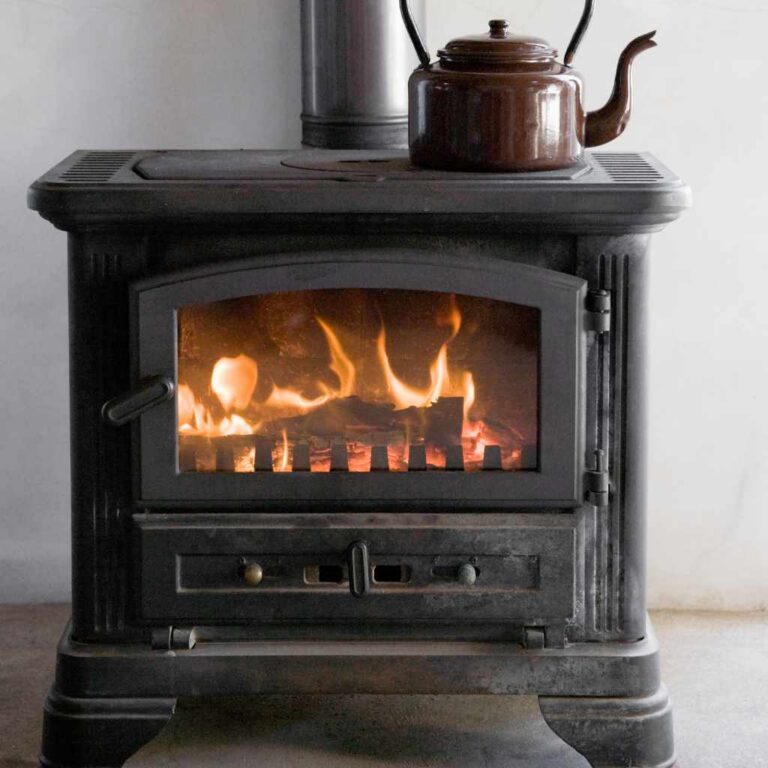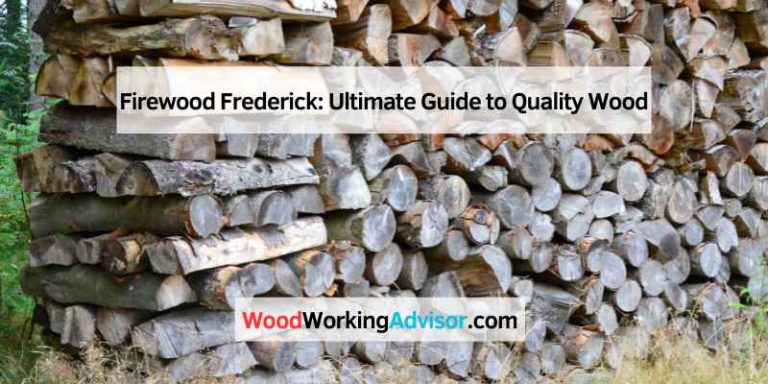Does Sycamore Make Good Firewood? Ignite the Facts!
Sycamore makes decent firewood, but it burns quickly and produces less heat compared to harder woods. It is best used for kindling or in a mixed firewood stack.
Sycamore trees are common in many regions, known for their distinctive bark and broad leaves. While they might not be the first choice for firewood, understanding their burning characteristics can help you make an informed decision. Sycamore wood tends to ignite easily and creates a pleasant aroma when burned.
However, due to its lower heat output and faster burn rate, it is often recommended for use alongside denser hardwoods. This type of wood can be a good option for those looking to start a fire quickly or for use in outdoor fire pits. Knowing how to use sycamore effectively can enhance your fire experience.
Sycamore Firewood Basics
Sycamore wood is a popular choice for firewood. It burns well and produces good heat. The wood has a light color and a straight grain.
Sycamore is known for its low smoke output. This makes it a clean-burning option. It also ignites easily, which is great for starting fires.
| Firewood Type | Heat Output | Burning Time |
|---|---|---|
| Sycamore | Medium | Short |
| Oak | High | Long |
| Pine | Low | Short |
Compared to oak, sycamore burns faster. Oak provides more heat and lasts longer. Pine ignites quickly but burns quickly.
Choosing sycamore depends on your needs. It works well for quick fires and easy use.
Seasoning Sycamore Wood
Properly drying sycamore wood is essential for good firewood. Seasoning helps reduce moisture content. Wet wood burns poorly and creates more smoke. Aim for a moisture level below 20% for the best results.
To speed up the seasoning process, follow these tips:
- Cut wood into smaller pieces. This increases surface area.
- Stack wood in a dry, sunny spot. Air circulation is important.
- Cover the top of the stack with a tarp. This protects from rain.
- Leave space between logs. This allows air to flow freely.
These steps help ensure sycamore wood dries quickly and burns efficiently.
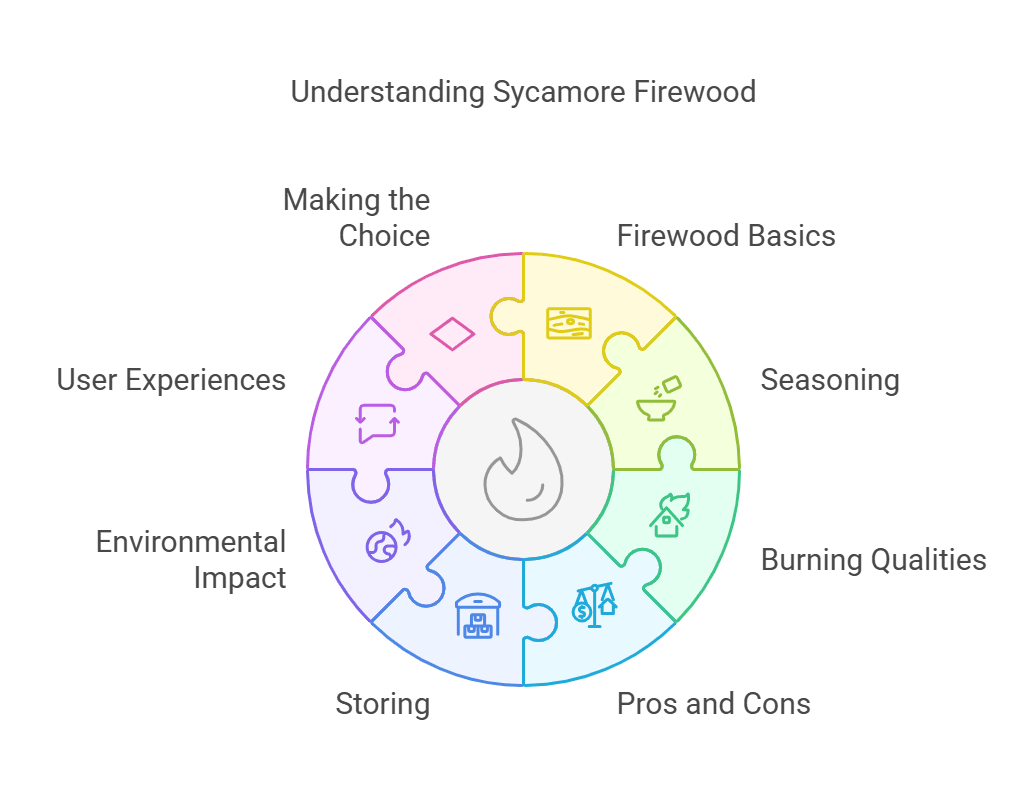
Burning Qualities Of Sycamore
Sycamore is known for its moderate heat output. It burns fairly well, making it a decent choice for firewood. Efficiency is acceptable, but not the highest among hardwoods.
One unique feature of sycamore is its low smoke production. This means it creates less pollution while burning. Sycamore also produces few sparks, making it safer for indoor use.
Overall, sycamore firewood offers a good balance of heat and safety. It is suitable for many types of fires, including campfires and wood stoves.
Pros And Cons Of Using Sycamore
Sycamore is a popular choice for firewood due to its many benefits. It burns well and produces good heat. This wood is easy to split and lightweight, making it ideal for many users.
Another advantage is its low smoke output. This means less pollution and cleaner air. Sycamore also dries quickly, allowing for faster seasoning time.
Yet, some drawbacks exist. Sycamore burns faster than other hardwoods. It may not last as long in the fire. This means more frequent wood additions are necessary.
Also, sycamore can produce more ash than denser woods. This requires regular cleaning of the fireplace. Be mindful of these factors when considering sycamore for your firewood needs.
Storing Sycamore Firewood
Storing sycamore firewood properly is very important. It helps keep the wood dry and ready to burn. Choose a dry area that is well-ventilated. Avoid storing wood on the ground. Use pallets or a platform to keep it off the soil.
Cover the wood with a tarp or a wood cover. This protects it from rain and snow. Make sure to leave the sides open for air to flow. This helps prevent mold and pests.
Regularly check for pests like insects or rodents. Treat any infestations quickly. Keeping your firewood stored well ensures it burns efficiently and safely.
Environmental Impact
Sycamore is a popular choice for firewood due to its sustainability. It grows quickly and can be harvested without harming the environment. This tree provides good heat output, making it efficient for burning.
Using sycamore as firewood helps reduce reliance on fossil fuels. Fossil fuels contribute to pollution and climate change. In contrast, sycamore is a renewable resource that supports a healthier planet.
| Aspect | Sycamore | Fossil Fuels |
|---|---|---|
| Sustainability | Renewable resource | Non-renewable resource |
| Environmental Impact | Lower emissions | Higher emissions |
| Heat Output | Good heat output | Variable heat output |
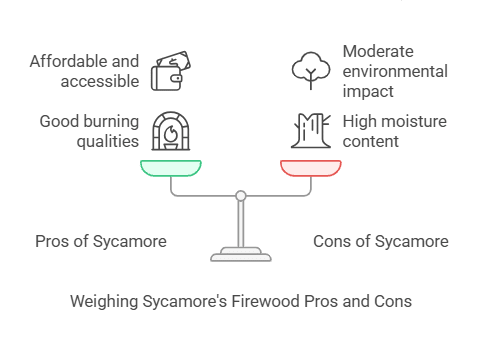
User Experiences
Many users share their experiences with burning sycamore. They often mention how quickly it ignites. This wood produces a bright flame and good heat. Some users enjoy the smokeless burn it provides.
Seasoned firewood users recommend seasoning sycamore for at least six months. This helps reduce moisture and improves burning quality. Users suggest cutting the wood into smaller logs for easier handling. Keeping the wood covered protects it from rain and snow.
Many also highlight the pleasant aroma that sycamore gives off. The wood is easy to split and work with. These qualities make it a popular choice among firewood enthusiasts.
Making The Choice
Sycamore can be a good choice for firewood. It burns slowly and produces moderate heat. Many people enjoy its pleasant aroma while it burns. Sycamore is easy to split and handle, making it user-friendly.
Consider your local climate and wood availability. If you live in a cold area, you may need higher heat output. Other options include oak, maple, and hickory. These woods often burn hotter and longer.
| Firewood Type | Heat Output | Ease of Splitting |
|---|---|---|
| Sycamore | Moderate | Easy |
| Oak | High | Moderate |
| Maple | High | Easy |
| Hickory | Very High | Moderate |
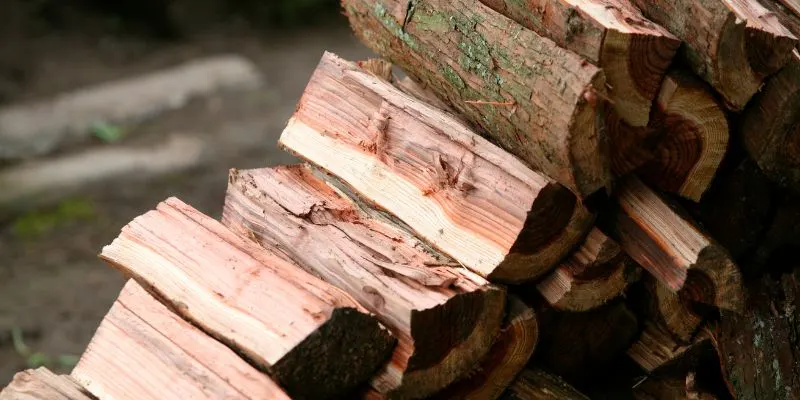
Frequently Asked Questions
Does Sycamore Burn Well For Firewood?
Yes, sycamore can burn well as firewood. It produces a moderate amount of heat and burns relatively clean. However, it has a higher moisture content when freshly cut. Seasoning the wood for at least six months is crucial for optimal burning efficiency and to reduce smoke.
How Does Sycamore Compare To Hardwoods?
Sycamore is classified as a hardwood but offers lower heat output than denser hardwoods like oak. While it ignites easily, its burning time is shorter. If you prefer longer-lasting heat, consider mixing sycamore with other hardwoods for improved performance and efficiency in your fireplace.
Is Sycamore Firewood Easy To Split?
Yes, sycamore is relatively easy to split, especially when seasoned. Its grain is not as interlocked as other hardwoods, allowing for cleaner splits. This makes it a good choice for those who prefer quick and efficient firewood preparation, saving you time and effort for your next fire.
Can Sycamore Wood Cause Creosote Buildup?
Sycamore wood can contribute to creosote buildup if not properly seasoned. Its higher moisture content leads to increased smoke and residue. To minimize creosote, ensure the wood is well-dried and maintain your chimney regularly. This will help keep your fireplace safe and efficient.
Conclusion
Sycamore can be a viable choice for firewood. It burns cleanly and produces a pleasant aroma. While it may not be the hottest-burning wood, it’s suitable for casual use. Consider seasoning it properly for the best results. Overall, sycamore offers a unique option for your firewood needs.




